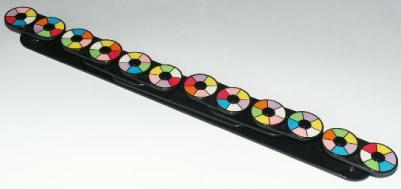


Spectra is a puzzle with 12 discs in a row, each disc with six coloured sectors. The discs all differ, using different combinations of six out of a total of eight colours. The discs are mounted on an arrangement of arms that looks a little like a car's windscreen wiper. An arm can be reversed so that the order of the discs attached to it is also reversed. The aim is to arrange the discs so that on every pair of adjacent discs the touching sectors match in colour, and also that the left sector of the first disc matches the right sector of the last disc. Not only that, but all eight colours must occur as such matching pairs of sectors.
The twelve discs are in six pairs, each pair mounted on one short arm, so it is possible to swap discs 1 and 2, 3 and 4, 5 and 6, ..., or 11 and 12. The second and third pair are mounted on a longer arm, so that discs 3-4 can be swapped with 5-6. Similarly pairs 7-8 and 9-10 can be swapped. Finally, the longest arm allows discs 3-6 to be swapped with discs 7-10. The linkages are illustrated below.
![]()
The colour arrangement on the 12 discs is as follows:
This is also illustrated below.
Other colour arrangements have also been produced. I have for example also come across this version:
This arrangement is equivalent to the previous one. The colours have simply been exchanged (yellow has become blue, blue has become pink, and so on). Apart from that, the colour order on discs 3 and 9 has changed slightly though the colours on opposite sides of those discs are still the same so this does not affect the solution.
Spectra was made by Eng's I.Q. Company Ltd. in 1987.
The 12 discs are mounted on 9 arms. Each of these arms has 2 positions, so they allow
the discs to be ordered in 29 = 512 different ways. Each disc of the discs
has 6 orientations, so all together they have 612 = 2,176,782,336 orientations.
This gives a total of 29612 = 1,114,512,556,032 positions.
This is not really a good reflection of the difficulty, for the simple reason
that once you have chosen an order and the orientation of the first disc, then the
orientations of the remaining discs are immediately deduced. Thus it is more fitting
to think of the number of positions being 296 = 3,072.
There are twelve positions where all adjacent discs match colour. The table below lists them all. Only the last one uses all eight colours, so that is the only proper solution. For each position I show a diagram, the order of the discs from left to right (where the discs have the same numbering as used above), and the colour on the left of the leftmost disc (which is the same as the right colour of the right disc).
| Diagram | Disc order | Outer colour |
|---|---|---|
| 2,1,8,7,9,10,5,6,3,4,12,11 | Orange | |
| 2,1,8,7,10,9,5,6,3,4,12,11 | Orange | |
| 2,1,8,7,9,10,6,5,3,4,12,11 | Orange | |
| 2,1,8,7,10,9,6,5,3,4,12,11 | Orange | |
| 2,1,8,7,9,10,5,6,4,3,12,11 | Orange | |
| 2,1,8,7,10,9,5,6,4,3,12,11 | Orange | |
| 2,1,8,7,9,10,6,5,4,3,12,11 | Orange | |
| 2,1,8,7,10,9,6,5,4,3,12,11 | Orange | |
| 1,2,8,7,9,10,4,3,6,5,11,12 | White | |
| 1,2,8,7,10,9,4,3,6,5,11,12 | White | |
| 1,2,3,4,5,6,7,8,9,10,11,12 | Red | |
| 1,2,3,4,5,6,7,8,10,9,11,12 | Red |
Note that the first eight are variations on one another, differing only in the order of the disc pairs 3-4, 5-6, and/or 9-10. The next two solutions only differ in the order of 9-10, as do the final two solutions.
The solution to the alternative colour variation is: